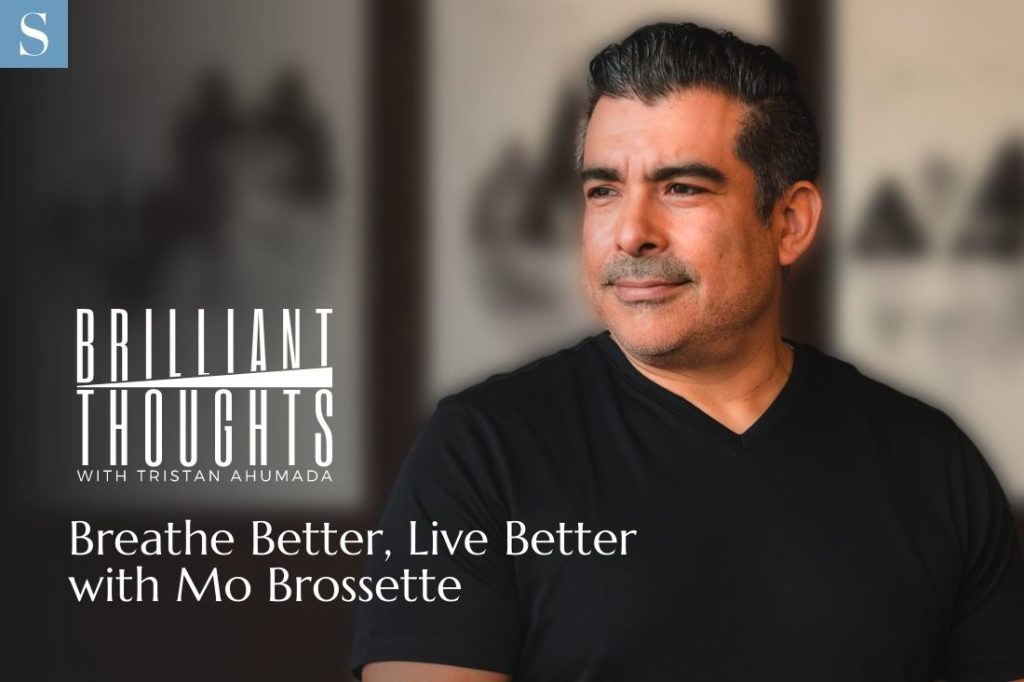If you’ve ever gotten a shot at the doctor’s office, you know that fearful anticipation can cause more discomfort than the actual thing you’re dreading. If fear is the root of so much pain, wouldn’t it be smart to avoid it altogether? Not according to acclaimed wellness specialist and keynote speaker Mo Brossette.
“It’s not about not being afraid, it’s about being in the middle of the fear and learning how to use that to do the right things,” explains Brossette in his latest interview with Brilliant Thoughts’ host Tristan Ahumada. Brossette is the creator of The Mindset Program at Dallas-based nonprofit The Adaptive Training Foundation (ATF) and founder of the leadership and self-development company, Hunt & Prosper.
His work at ATF focuses on military veterans and civilians who have experienced traumatic injuries, ranging from amputations to strokes to Parkinson’s disease. He says that for people who have lived through this kind of trauma, avoiding fear altogether isn’t exactly on the table. However, through awareness and breathing, they can learn to transform it into something useful.
Accept that you have fears.
“You know, if anyone ever tells you that they’re fearless, they’re lying to you,” says Brossette. Whenever you’re doing something scary, new or difficult, or something you’ve tried and failed before, you’re going to feel fear. The real question is how you will respond to it.
Fear can be a fantastic teacher. It can highlight past failures and places for improvement. Brossette suggests that instead of pushing your fear away, figure out what it’s trying to tell you. Think about the worst things that could happen and write them down. Then plan for how you’ll circumvent those mistakes and how you would react if they happened.
“I do a men’s leadership program where I teach men how to deal with stress, how to love themselves with language, how to be tactically ready, how to prepare for emergency situations,” explains Brossette. “It’s being prepared for that day, and not just hoping that something good is going to happen.”
Find your flow state.
Stop whatever you’re doing and try this:
Breathe in through your nose for four seconds, hold it for two seconds and then exhale (through your nose or mouth) for six. Repeat several times, then check in with yourself. How do you feel?
According to Brossette, you will almost certainly feel more relaxed. That’s because breathing at this pace and allowing your diaphragm to expand and contract automatically puts your brain into a flow state of alpha waves. Alpha waves induce calmness and creativity and increase cognitive function, which is why breathing is the first skill Brossette teaches his clients.
Reframe your language.
After breathing, Brossette focuses on a client’s self-talk. Language is powerful and shapes the parameters of what we consider to be possible. For people in the adaptive training community, self-limiting talk can be extremely detrimental to progress.
“Don’t tell me what you can’t do,” Brossette says he tells his clients. “I don’t care who you used to be, I don’t care what you did yesterday, I care about the person you are right now.”
But it isn’t just our internal monologue that matters; it’s also the way we use language to describe the world around us. That’s why when Brossette works with military or civilian clients who have traumatic injuries, he doesn’t say they “suffered” them—he says they “experienced” them. These small shifts can bolster confidence and establish a more positive outlook in which anything is possible.
Transform fear into fuel.
In addition to being more relaxed after the breathing exercise, you might notice you feel a little more focused. When you’re able to think clearly in the moment, you’re less likely to be carried away by overwhelming feelings like fear. Doing breathwork gives you the mental clarity to be able to transform fear into something else, a trick that’s especially useful for performers.
“You need to use it for excitement and that’s what performers do,” explains Brossette. “We use the fear to get excited about what’s about to happen.”
To Brossette, there’s no guarantee that everyone will be able to conquer their fear in this way, a lesson he’s learned working with the adaptive population. However, you have to try something to break the fight-or-flight headspace associated with it. He says that ditching the phone and social media or standing in nature for a while are also great ways to achieve this.
Let go of perfection.
Sometimes, no amount of breathwork, awareness or preparation can neutralize fear. For entrepreneurs, these moments might look like slipping up on stage or forgetting pertinent information when talking to a client. Although Brossette understands these instances can be disheartening, he says it’s critical to just keep going and move on.
“You gotta learn to roll with it,” he explains. “It’s about also having the ability to shift in flex and really not be perfect, because no one is.”
If you only feel comfortable being perfect, you’re never going to take chances. And for self-starters and business people, risk is just part of the game. Instead of letting apprehension stop you from achieving your goals, Brossette says you should focus on the factors you can control, like focusing on breathing to relax into a tranquil headspace.
Find what meditation means to you.
If you want to change how you respond to negative thoughts, practicing mindfulness meditation is a must. However, it doesn’t mean you have to sit cross-legged with your eyes closed in silence. It can be any activity that creates a similar effect.
“Here’s the definition of mindfulness meditation: paying attention to a specific thing, in the present moment, on purpose, while breathing without judgment,” says Brossette. “That is the definition of mindfulness meditation, so what I help people understand is hey, man, you’re already doing it.”
As you practice intentional breathing and awareness, you’ll start noticing more space between random thoughts. Over time, this practice will change the way you interact with unwanted thoughts like fear and give you more freedom over your reactions. The best part? You can get started today, just by breathing with intention.
Brilliant Thoughts with Tristan Ahumada is no longer releasing new episodes on the SUCCESS Podcast Network, but you can still listen to the full conversation below.












